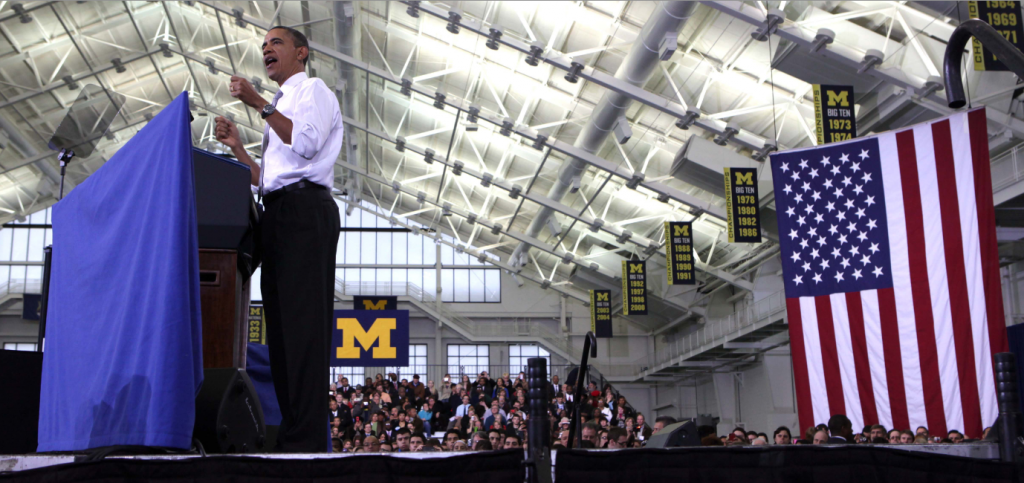President’s Proposal Would Affect Future Financial Aid
February 22, 2012

During his State of the Union address on Jan. 24, Barack Obama proposed a tuition cap on college education, saying that institutions that continued to raise prices would be cut off from some federal funding. Fordham, which was named the eighth most expensive college in the nation by Forbes last year, has cause to remain alert about the proposal. If it were to be implemented, Fordham’s financal aid package for students could face some changes.
“We can’t just keep subsidizing skyrocketing tuition; we’ll run out of money,” Obama said during his speech last month. “States also need to do their part, by making higher education a higher priority in their budgets. And colleges and universities have to do their part by working to keep costs down.”
The proposal advocates lower tuition prices, smaller increases in tuition and admitting more low-income students. Under the proposal, federal work study programs, Federal Supplemental Educational Opportunity Grants (FSEOG) and Perkins loans could face cuts from the federal government. According to Tom Dunne, vice president for administration, the overall amount in financial aid Fordham students received during the 2010-2011 school year was 113 million dollars—with 96 million of that used for undergraduates. During the 2010-2011, Fordham offered $898,463 in Federal Supplemental Education Opportunity Grants, $1,110,326 in Perkins loans and $2,137,284 toward work study programs.
The proposal has caused some stir with university administrators.
“This is the first time in history the government has tied federal campus aid to campus tuition policies,” said Dunne. “It has had the higher education sector quite upset.”
While Dunne feels that the proposal’s support for Pell grants and the doubling of work study jobs for five years is beneficial, a major flaw with it is that it doesn’t take into account regionalization.
“Our costs are high because of the fact that we’re in New York City,” Dunne said. “Room and board, tuition—anything seems to be higher in New York City as opposed to other parts of the state. The president’s proposal is trying to lump everyone together and it’s not fair and it doesn’t take into consideration the high cost of living in the city.”
If the proposal were to go into effect, Dunne thinks it could harm the quality of Fordham as a whole by cutting benefits for staff, having professors teach more classes and hiring more adjuncts to teach instead of professionals.
“Fordham is successful because it’s a quality institution,” Dunne said. “We’re always working on the affordability issue and trying to lower costs. It’s difficult to say to someone, ‘Oh we’re going to lower your salary.’”
Zeinab Sayed, FCLC ’13, said she thinks Fordham administration might feel that affordability tarnishes the prestige of Fordham. She said that it is important for the government to get more involved “because it will benefit students who are paying so much for tuition. Obama was a student at Harvard, so he could put himself in our shoes because he went through it, too,” she said
With student loan debt at an average of $25,000 per student after graduation, according to CNN, affording college education and paying back loans is at the forefront of many students’ minds. The proposal could be the ticket for the student vote Obama seeks.
According to Christina Greer, professor of political science at FCLC, Obama’s decision to speak about this during the State of the Union address was a move to get more votes.
“By saying that he supports education, that is not just a nod to the youth vote, but that’s also a lot of parents who are looking down the road at a $50,000 tuition bill every fall,” Greer said.
While the proposal has not been approved by Congress yet, Greer said the President needs to be cautious if the plan were to eventually be implemented.
“We really want to be careful not to set up a system in the United States where our institutions of higher learning are only for people of a particular financial background,” Greer said. She said that we do not want cases where east coast and west coast students stay in their respective parts of the United States for higher education. If that were to happen, she said that, “universities would lose out on intellectual diversity in classrooms that come from ethnic or geographic variety.”
The success of the program, Greer said, depends on what kind of caps will be placed on financial aid.
When asked if the proposal would be successful if implemented, Greer said that it depends on how it will be enacted and what kind of caps will be placed on schools. “If there are small limits, universities can help find the money to subsidize in other ways, but if the caps are so severe, then we start seeing people that fundamentally can’t [afford] and even think about Fordham as an option,” she said.
Greer said that she thinks it is important for college students to pay attention to these types of proposals as the cost of higher education increases and more people need government subsidies to help offset these costs.
“Many people think politics is just about voting, but so much of the policies that go on are beyond social security and more,” Greer said. “It’s things that actually directly impact you and your finances.”









